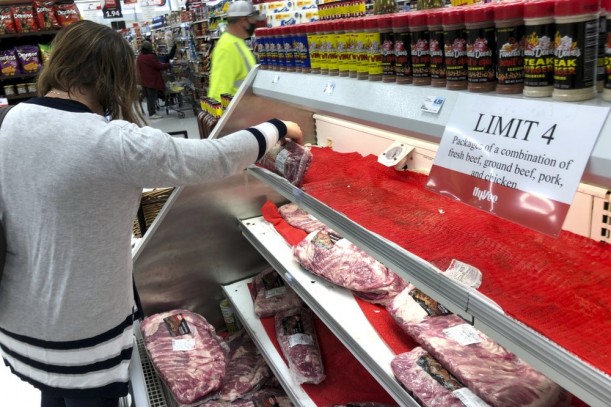Ricketts: Nearly 1 in 6 Cases in Nebraska Linked to Meat Plants

A sign limiting customers to four items of fresh meat hangs over semi-stocked shelves at a Hy-Vee supermarket in Omaha, Wednesday, May 6, 2020. A Hy-Vee spokesperson said the decision to put a limit on the sale of meat is due to worker shortages at plants as well as an increase in meat sales. (AP)
Lincoln – Nearly one out of six coronavirus cases in Nebraska have been linked to the state’s meatpacking plants, Gov. Pete Ricketts said amid criticism that not enough is being done to protect the health of their workers.
Ricketts said last Thursday that public health officials have linked about 1,005 of Nebraska’s 6,771 coronavirus cases to meatpacking plants. Nebraska’s small, mostly rural meatpacking communities have become some of the biggest hot spots both statewide and nationally, with Hall County surpassing the much larger Omaha area.
Asked whether he should have done more to prevent the spread of the virus in the plants, Ricketts said critics were trying to “Monday morning quarter back” on a disaster that the state hasn’t faced since the 1918 flu outbreak.
“Hindsight’s always going to be 20/20,” he said at a news conference. “It’s called, yes, if I had known things two months ago that I know today, I would have done things differently. But that’s called experience. Of course you hope you’d learn from your experience to do a better job going forward in the future, and that’s what we’ve done.”
Critics said state and local officials and many of the meatpacking plants didn’t act soon enough and still haven’t taken all the steps necessary to protect workers, many of whom are non-English-speaking immigrants.
Rose Godinez, an attorney for the ACLU of Nebraska, said workers have told her that some plants are following the recommendations of local and federal public health experts, but others aren’t. The group unveiled a petition with more than 900 signatures, calling for more testing and protective equipment for workers and asking companies to offer paid sick leave.
Godinez said some workers received their first masks just two weeks ago, even though the outbreak began in March, and others are being pushed into unfamiliar jobs to compensate for staffing shortages.
In Omaha, Douglas County Public Health Director Dr. Adi Pour said that 392 meatpacking workers have contracted the virus out of 1,205 confirmed cases. Pour said medical professionals are working with the nine metro-area plants to get additional testing and housing for those who are already infected and need to stay away from their families.
“From a public health standpoint, I’m concerned that we are not having our infection under control,” she said at a separate news conference with Omaha Mayor Jean Stothert.
Ricketts said state officials learned important lessons from an initial outbreak at the JBS beef plant in Grand Island, the state’s first hot spot and hardest-hit region. He said state officials used that experience to test more aggressively in Lexington, another meatpacking town that hasn’t seen as many cases but is still considered a hot spot.
He has refused to tell meatpacking plants that they have to close, arguing that they’re an essential part of the nation’s food supply and Nebraska would experience “civil unrest” if residents weren’t able to buy meat.
Ricketts also reiterated that he won’t require local health departments to release the number of cases at individual companies.
He argued that those numbers are inaccurate because some people who tested positive have lied about working at specific plants, and public health officials aren’t able to verify those claims without violating federal privacy laws. He said such mistakes would be minimized with aggregate data.
User login
Omaha Daily Record
The Daily Record
222 South 72nd Street, Suite 302
Omaha, Nebraska
68114
United States
Tele (402) 345-1303
Fax (402) 345-2351




